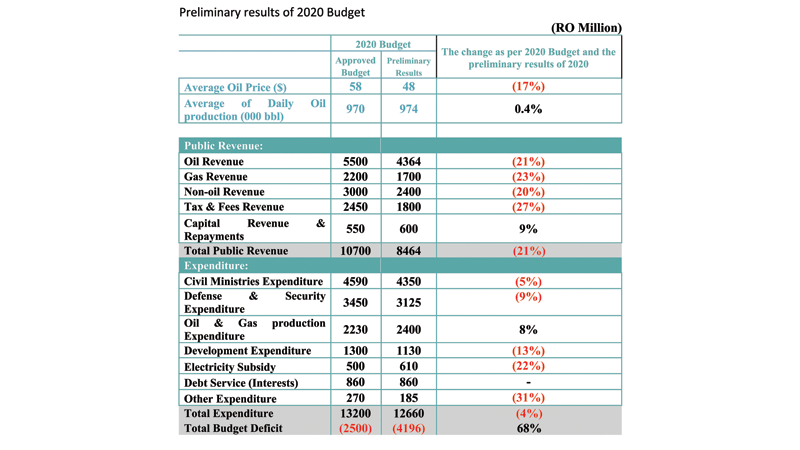


RISING DEFICIT: The 2020 Budget deficit is projected to reach nearly RO 4.2 billion, up by RO 1.7 billion than the estimated deficit of RO 2.5 billion
BUSINESS REPORTER -
MUSCAT, Jan 3 -
A series of far-reaching measures by the Omani government to reduce public expenditure in the face of diminishing revenues from oil exports and a wider economic slowdown have helped cut budgeted expenditures in the 2020 General Budget by a significant RO 540 million.
Citing preliminary results, the Ministry of Finance noted that public spending declined to about RO 12.7 billion as compared with the budgeted figure of RO 13.2 billion, entailing a decrease of RO 540 million.
It attributed the outcome to a number of fiscal measures taken during 2020, including a 10 per cent cut in the approved budgets of government units, 10 per cent reduction in the operating and administrative expenses of state-owned enterprises (SOEs), 10 per cent reduction in the approved allocations of development projects, and a suspension of most projects carried out by SOEs.
Commenting on the performance of the 2020 Budget, the ministry said: “In light of the consequences triggered by the pandemic and continued low oil prices which have severely affected economic growth and public finance in 2020, the preliminary results of 2020 Budget show a decline in total revenue that led to higher deficit than that estimated in 2020 budget.
The total revenue is projected to reach RO 8.5 billion as compared with the budgeted figure of RO 10.7 billion. Public spending has declined to nearly RO 12.7 billion, down by 4 per cent as compared with 2020 Budget. However, the primary deficit rose by RO 1.7 billion i.e. 68 per cent, reaching to RO 4.2 billion, as against the budget deficit,” it stated.
The 2020 Budget faced dual challenges of lower oil prices than the assumed oil price, and economic and financial implications triggered by COVID-19 pandemic, according to the ministry.
Preliminary results show a decline in aggregate revenue to lower levels as compared with the budgeted figures.
Oil revenue declined by RO 1.1 billion due to average oil price being lower than the assumed price in the budget by $10 per barrel. Gas revenue dropped by RO 500 million as a result of a decline in natural gas price as well as lower sales.
Non-oil revenue declined by RO 600 million due to the impacts of the COVID-19 pandemic.
To mitigate the effects on economic activity, the government waived several fees and taxes (such as tourism tax, municipality fees and tax, industrial areas rents, commercial register renewal fee, shipping and handling fees and others), which helped fuel the decline in non-oil revenue, it said.
“Therefore, total revenue reached nearly RO 8.5 billion by the end of 2020, down by 21 per cent as compared with the budgeted figure of RO 10.7 billion,” it pointed out.
Significantly, the 2020 Budget deficit is projected to reach nearly RO 4.2 billion, up by RO 1.7 billion than the estimated deficit of RO 2.5 billion in 2020 Budget. This is attributed to the implications of COVID-19 and sharp drop in oil prices, the ministry added.
Oman Observer is now on the WhatsApp channel. Click here



